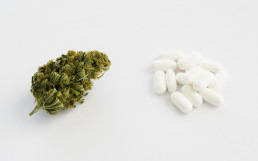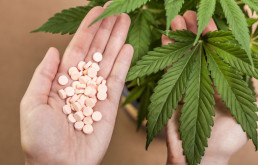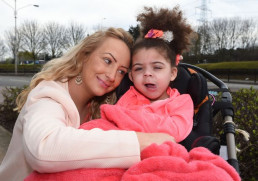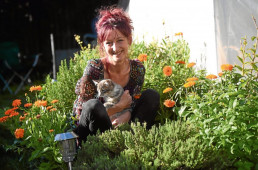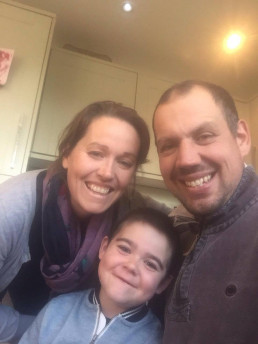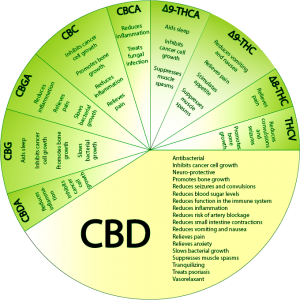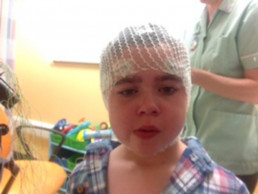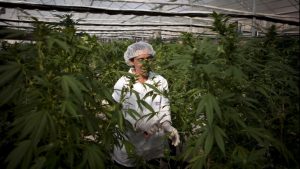Pharmaceutical Company Which Makes Fentanyl Running CBD Clinical Trials
Pharmaceutical Company Which Makes Fentanyl Running CBD Clinical Trials
- Insys Therapeutics, makers of Fentanyl, is running clinical trials into medical properties of cannabidiol (CBD)
- Insys donated $500,000 last year to the campaign to defeat cannabis legalization in Arizona
- The US is currently fighting an opioid epidemic, which claimed the lives of more than 15,000 people in 2015
A large pharmaceutical company which spent half a million dollars campaigning against cannabis legalisation in Arizona is now running clinical trials into cannabidiol (CBD).
Insys Therapeutics, makers of synthetic opioid Fentanyl, is currently running a number of clinical trials investigating the use of cannabis-based therapies for a variety of ailments.
Some of the trials they are currently running are: “Cannabidiol Oral Solution in Pediatric Participants With Treatment-resistant Seizure Disorders,” (medication for treatment-resistant child epilepsy) “Cannabidiol Oral Solution for Treatment of Refractory Infantile Spasms,” and “Cannabidiol Oral Solution for The Treatment of Subjects With Prader-Willi Syndrome.”
Other pharmaceutical companies have already funded research into CBD, such as GW Pharmaceuticals research into treatment-resistant epilepsy. Why would a company which spent so much money lobbying against the legalisation of medical marijuana start researching the very chemicals it deems so harmful?
America’s current opioid epidemic may hold the answer.
Opioids (including prescription opioids, heroin, and fentanyl) killed more than 33,000 people in 2015, with more than 15,000 people dying from overdoses involving prescription opioids.
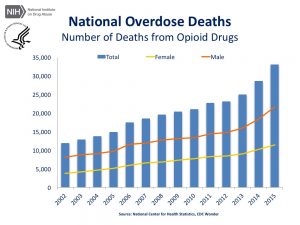
Medical Marijuana has long been seen as the answer to this growing opioid crisis.
Cannabis is a threat to legal pharmaceutical opioid-based medications as it is able to deal with the chronic pain which most people are prescribed opioids for. A recent study found that 97% of patients “strongly agreed” that they were able to decrease the number of opiates they consume when they also used cannabis.
Cannabis is so successful at replacing these dangerous opioid medications that opioid deaths fell by 6.5% two years after Colorado legalised cannabis for recreational purposes in 2015.
But why would a company, which can clearly see the potential medical properties of cannabinoids, spend so much money on keeping the very plant they come from criminalized? Money.
Companies such as Insys and GW stand to earn a significant amount of money if patients start using cannabinoid-based medication if cannabis, the plant, is kept illegal.
Patients will be forced to source their medication for large pharmaceutical companies rather than be able to grow their own, at a fraction of the cost.
Sativex, the UK’s only legal cannabinoid-medication, is currently prescribed on the NHS at a cost of £125 per 10ml bottle, or up to £5500 per year. For many patients, this is a cost which cannot be met.
Pharmaceutically made cannabis may be a great option for some patients, but it should not be their only choice. There is a fantastic range fo methods of medicating with cannabis, including ingesting it as an “edible.”
If we remove the patient’s right to chose their own medication we are limiting their quality of life.
Have you replaced your pharmaceutical medications with cannabis? Let us know in the comments.[/fusion_text][/three_fourth][fusion_text]
References and further Reading
https://clinicaltrials.gov/ct2/show/NCT02324673?term=Insys+cannabidiol&rank=1
https://clinicaltrials.gov/ct2/show/NCT02551731?term=Insys&draw=1&rank=10
https://clinicaltrials.gov/ct2/show/NCT02844933?term=Insys&draw=1&rank=5
https://www.cdc.gov/drugoverdose/data/overdose.html
Opioid deaths fall in Colorado following recreational cannabis legalisation
Opioid deaths fall in Colorado following recreational cannabis legalisation
- Legalisation of recreational cannabis in Colorado is saving lives according to new research
- Opioid deaths fell by 6.5% two years after Colorado legalised cannabis for recreational purposes in 2015
- 10,000 of people die from opioid abuse in America every year
According to new research, legalisation of recreational cannabis in Colorado has led to a drop in opiate overdoses in the state.
Researchers from the University of North Texas, University of Florida and Emory University, examined monthly opiate overdose trends in Colorado overdose fatalities before and after the state’s recreational marijuana market opened in 2014.
They found that in the two years since Colorado legalised cannabis for recreational purposes, opiate deaths fell by 6.5%. Researchers also tried to isolate the effect of recreational, rather than medical, cannabis by comparing results to Nevada, where only medical marijuana was legal during that period. Nevada legalised recreational cannabis earlier this year.
The authors stress that results are only “preliminary,” and emphasize that the data only showed an association, not clear evidence that legalizing cannabis was directly responsible for reducing overdose deaths.
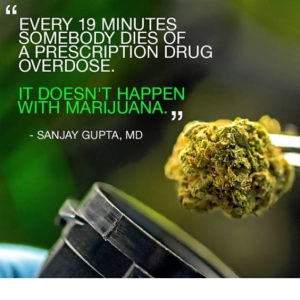
The report stated: “This reduction represents a reversal of the upward trend in opioid-related deaths in Colorado.
“Legalization of cannabis in Colorado was associated with short-term reductions in opioid-related deaths.
“For policymakers to balance the potential beneficial and deleterious effects of these laws, researchers must continue to examine the full range of health effects in both clinic- and population-level research.”
While we have reported on patients swapping opioid medications for medical cannabis, this report is one of the first to look at the impact of recreational cannabis laws on opioid deaths.
Opioid abuse is the leading cause of accidental death in the US, with over 1,000 people being treated in emergency departments for misusing prescription opioids every day.
The UK is also facing an “opioid crisis,” unless something is done to curb the overprescribing and abuse of dangerous pharmaceutical medications.
Many people are prescribed opioids to deal with chronic pain, something medical cannabis is world-renown for.

According to a team of researchers from the Veterans Health Administration, between 45-85% of patients seeking medical marijuana in the U.S. do so for management of pain. Again, researchers stressed more research is needed.
Research on medical cannabis in the UK is restricted by its Schedule I status.
Could legalising cannabis for recreational purposes help prevent a similar opioid crisis in the UK?
As more and more research comes out supporting the argument that cannabis is a more suitable, and safer, alternative to opioids, it is becoming harder to deny.
References and further Reading
http://ajph.aphapublications.org/doi/full/10.2105/AJPH.2017.304059
https://www.samhsa.gov/data/sites/default/files/NSDUH-DetTabs2014/NSDUH-DetTabs2014.pdf
Can medical marijuana replace pharmaceutical pain medications?
Can medical marijuana replace pharmaceutical pain medications?
- Cannabis has been used medically to treat pain for centuries
- Latest study conducted on cannabis as a pain treatment found 97% of patients “strongly agreed” that they were able to decrease the number of opiates they consume when they also used cannabis
- Findings could pose serious risk to the future of pharmaceutical opioid-based pain medications, which are the leading cause of accidental death in the US
- Head researcher called for medical professionals to “get over their reefer madness”
After more than 28,000 people died from opioid abuse in 2014 in the USA, researchers from
the University of California Berkley and HelloMD, one of the largest medical cannabis communities in the USA, conducted a study on cannabis as a substitute for pain medication.
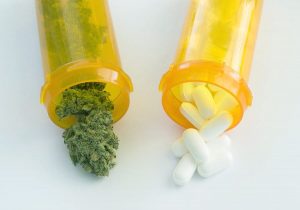
Researchers examined the use of cannabis as a substitute for opioid-based pain medication by collecting survey data from 2897 medical cannabis patients. They found that nearly 100% of respondents claiming cannabis has helped them decrease their use of prescription opioids to treat pain.
Nearly 3,000 patients, who use both opioid and non-opioid based pain medication, were surveyed for the study.
While only 34% of the sample reported using opioid-based pain medication in the past 6 months, participants overwhelmingly reported that medical marijuana provided equal pain relief to their other medications, but without the unwanted side effects.
One of the most striking findings from the study was that 97% of respondents “strongly agreed/agreed” that they could decrease use of their opioid medications when using cannabis.
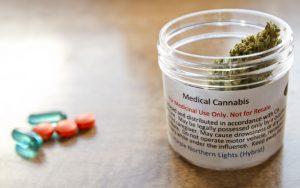
92% of participants also “strongly agreed/agreed” that they prefer cannabis to treat their medical condition.
An amazing 81% of respondents “strongly agreed/ agreed” that using cannabis alone was more effective than taking cannabis with opioids.
“It’s past time for the medical profession to get over their reefer madness and start working with the medical cannabis movement and industry to slow down the destruction being caused by the overprescribing and overuse of opioids.“
– heard researcher Amanda Reiman
Chronic pain, and how to deal with it, is a growing issue across the world, particularly in the United States. 11.2% of US adults affected by chronic pain, with 3-4% of these patients are placed on long-term opioid prescriptions.
If medical marijuana can truly replace a significant amount of these opioid-based painkillers, it is no wonder large pharmaceutical companies are spending billions of dollars lobbying American politicians to uphold prohibition.
Currently, pharmaceutical companies make up to $635 billion dollars per year selling painkillers in the US. Medical cannabis poses a very real threat to this, to the point where
pharmaceutical company, Insys, spent $500,000 to block legalization in Arizona.
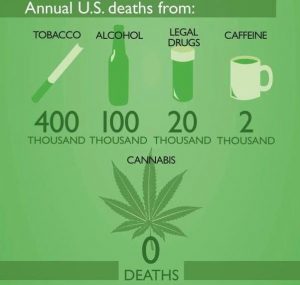
Commenting on the study’s findings, heard researcher Amanda Reiman, said: “Cannabis has been used throughout the world for thousands of years to treat pain and other physical and mental health conditions.
“Patients have been telling us for decades that this practice is producing better outcomes than the use of opioid-based medications.
“It’s past time for the medical profession to get over their reefer madness and start working with the medical cannabis movement and industry to slow down the destruction being caused by the overprescribing and overuse of opioids.”
Have you replaced dangerous pharmaceutical drugs with medical marijuana?
References and further Reading
https://www.cdc.gov/media/releases/2015/p1218-drug-overdose.html
http://online.liebertpub.com/doi/10.1089/can.2017.0012
https://www.cdc.gov/mmwr/volumes/65/rr/rr6501e1.htm
https://www.ncbi.nlm.nih.gov/pubmed/27001005
Billy Caldwell Unites Northern Irish Politicians for Parliament Protest
Billy Caldwell Unites Northern Irish Politicians for Parliament Protest
- Every political party in Northern Ireland have “been united” by Billy Caldwell, the first patient to be legally prescribed cannabis oil on the NHS
- Hundreds are expected to protest outside Northern Ireland’s Parliament next week for the legalisation of medicinal cannabis
- Members from Shin Fein, the Ulster Unionist Party, the Green Party and even the DUP are expected to speak at the protest next week, as well as doctors, cannabis patients and activists
In an amazing turn of events, Northern Ireland is on the brink of legalising cannabis for medicinal purposes.
United by heroic young medical marijuana patient and spokesperson, Billy Caldwell, all the major political parties will be standing in support of the child and “Billy’s Law,” a bill designed to legalise cannabis for medicinal purposes in Northern Ireland.
Representatives from Sinn Fein, the Green Party, the Social Democratic and Labour Party (SDLP), The Ulster Unionists (UUP), the Alliance Party and even the Democratic Unionists (DUP) will be standing with Billy at the protest outside Stormont (Northern Ireland’s Parliament) on the 10th October.
With every party confirming they will vote in favour of passing “Billy’s Law,” legal medicinal cannabis in Northern Ireland is now a question of when, not if. Discussing the amazing news, Charlotte Caldwell, Billy’s mother and tireless medical cannabis advocate, explained why she felt it was so important to get politicians on-board:
“We knew we needed the politicians on our side to make the protest credible.

“The hardest part of any argument is winning over the politicians, and we’ve… Billy’s managed to do it!
“I put it all down to billy. He’s the advocate. He’s the wee boy who suffered all them seizures and nearly died. He’s the one who the politicians have taken under their wing, and the boy who has won the nation’s heart.
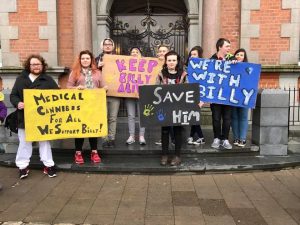
“The fact they’re all coming up to Stormont to speak alongside us is amazing. It’s just amazing!”
Charlotte explained that the progress that will be made in Northern Ireland is due to the unity among the political factions, as well as ‘playing by their rules.’
“It’s unprecedented, it’s totally amazing that we’ve managed to get all the major political parties to unite.

“Even in countries where there is legal medical cannabis, there’s normally opposition from other parties.
“Because I did things the way I did, speaking to doctors and politicians, getting them on board, through the last year’s campaign… We’ve really won over people to Billy’s story and the argument to legalise medicinal cannabis.”
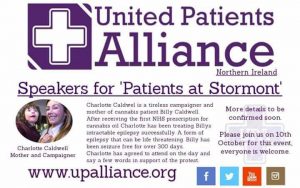
“As far as I’m concerned, there is no debate. There’s nothing to debate. It’s done. Medical cannabis will be legal in Northern Ireland!”
– Charlotte Caldwell
Recreational cannabis, however, will still be banned under the bill:
“The bill is only for medical use. A lot of people are still very wary about cannabis, it’s been difficult to get them on board this far.
“But we now have a foot in the door! As far as I’m concerned, there is no debate. There’s nothing to debate. It’s done. Medical cannabis will be legal in Northern Ireland!
“I’d like to think that it’ll go through by the end of the year!”

Gareth Tuff, who organised the protest and suffers from MS, discussed his own amazement at the momentum the protest has picked up and the incredible news regarding the unity of the parties:
“I didn’t expect this to happen! I expected to hopefully change some minds or preconceived notions about cannabis, but not this.
“If I’m truly honest the person that really set me on the right path was the Ulster Unionist MLA Alay Allan.
“Andy really took me by surprise on this, he was much more progressive than I thought he would’ve been.
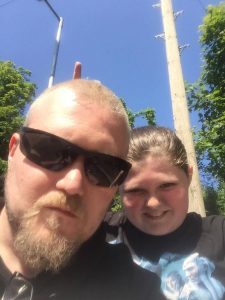
“He and many others, I believe, understand that this drug can help many, many patients and I truly believe they will work together and make something happen, what, I don’t know!
“All we can do is bask in the fact that we have managed to bring them all together around this one issue!”
“Patients at Stormont” is on the 10th October, Tuesday next week, and will be supported by the UPA.
To follow Billy’s continuing amazing story, follow his official Facebook page.
Hero British Mother “Saved” Severely Brain Damaged Child with Medical Cannabis
Hero British Mother “Saved” Severely Brain Damaged Child with Medical Cannabis
- Louis Bostock has been legally treating her severely brain-damaged daughter, Jayla, for 2 years with cannabis oil
- The niece of Aston Villa footballer Gabby Agbonlahor is the UK’s youngest legally approved Class B drug user
- Louise has no become an active member in the medical cannabis community, helping to source medication for patients like Jayla
- “If Jayla can be helped by this beautiful plant then why can’t other children? Why?”
Heroic British mother, Louise Bostock, who has been legally treating her severely disabled daughter with cannabis oil, has spoken out about the unjust cannabis laws in the UK.
Jayla, 6, suffers from severely debilitating brain damage, became the UK’s youngest legal cannabis patient two years ago, after her mother won over local medical and law authorities.
Born a normal, healthy child, Jayla began suffering intractable seizures shortly before her first birthday.

Doctors were unable to diagnose the dying child, prescribing her a cocktail of pharmaceutical drugs which left the young girl in a comatose state. Louise explained how these drugs were negatively impacting her daughter’s health and well-being:
“Just before her first Birthday she started to seizure. The Doctor’s initially thought it was epilepsy, and prescribed her lots of drugs.
“At one point the drugs caused her to have a cardiac arrest! Jayla over-dosed on Phenobarbitone and had to spend 5 days in intensive care.
“With cannabis, there is none of this!”

Desperate for a solution, Louise finally turned to medical marijuana after doctors at Birmingham Children’s Hospital revealed Jayla was resistant to conventional medication.
“What do you do when there’s no hope?” Louise explained. “Wouldn’t you do everything for your child in the same situation?”
Louise noticed an immediate improvement in Jayla’s quality of life after first trying medical cannabis:“Before cannabis, Jayla used to be
“Before cannabis, Jayla used to be hospitalised every three or four weeks with seizures. Now she can go months without one.
“She’s smiling and happy and has so much more life. She used to be comatose and sleep all day.
“Now, she watches TV with a smile on her face. I heard her laugh out loud for the first time, can you imagine!”

Jayla’s success with medical cannabis has inspired Louise to help other desperate parents and patients across the UK access the medical herb.
“Lots of people come to me for help, so I help to source people the oil and offer it to them.
“If you have no options left, if you have no hope, you have to at least try! If you don’t, you’ll never know if it can help!
“A lot of people are scared to try it or don’t know about it. That needs to change.
“Cannabis is such a beautiful plant, but it is being held back by our Government. Why is it being held back? If my child can have it, why not other children? Why!?
“How many children and people are dying, being given morphine, and just being drugging up? There are so many cases in the UK,” Louise added, explaining her frustration of the legal status of cannabis in the UK.
“Why is it so freely available to American parents?
“It’s a human right! I want to go to the High Court.”
Louise’s story has already inspired parents of severely ill children to seek her out for advice and help.
“…you don’t have to be a doctor to save someone’s life.”
– Louise Bostock
“A father from wales, who’s daughter is dying in a hospice, met me last night to get his daughter some oil. She is dying and being prescribed Midazolam, but it is not working and she is still having seizures.
“Neither the doctors of the father know what to do. I just told him to look for hope and wean her off those terrible drugs!”
Campaigning for access to medical cannabis has become a calling for the courageous mother of two:

“I always knew I was brought to Earth for a reason. I just want to carry on helping as many people as possible.
“Well, it’s Jayla’s calling, and I’m her voice!”
Asked whether she was worried about the negative stigma attached to medical marijuana, Louise laughed the suggestion off:
“I just ask skeptics: ‘What if something happens to child?’
“Look, I’m not a medical professional. Not at all. But you don’t have to be a doctor to save someone’s life.”
The UK needs more courageous parents and patients to speak out to help the British Government understand that cannabis does have medicinal properties and that it is helping thousands of patients in the UK.
Louise risked everything to save her daughter. The social services and local police were called after she admitted to Jayla’s nurses that her miraculous recovery was due to medical marijuana.
“At first, I thought I was going to lose her.
“Now, she is legally allowed to consume Sacred Kanna cannabis oil from Holland.”
As more and more cannabis success stories are brought to the national conversation, how much longer can the British Government ignore the scientific evidence and human right to be healthy?
Next week the UPA have organised Patients at Parliament protest. We encourage all medical patients and activists to make it down to London on 10th October to make your voice heard!
Scottish Cancer Sufferer Faces Criminal Charges for Treating Cancer with Medicinal Cannabis
Scottish Cancer Sufferer Faces Criminal Charges for Treating Cancer with Medicinal Cannabis
- Jacqui Ritchie, 49, was prosecuted for growing 4 cannabis plants
- The mother of two claimed cannabis helped with the side-effects of chemotherapy for her rare breast cancer
- Jacqui was prosecuted last month and is awaiting sentencing on October 10
A cancer survivor has been prosecuted for growing four medicinal cannabis plants to help combat the side-effects of chemotherapy and treat her cancer.
Mother of two, Jacqui Ritchie, 49, from Stonehaven in Scotland, was diagnosed with a rare and aggressive form of breast cancer in 2014, triple negative metaplastic breast cancer. Only around 600 others in the world have been diagnosed with this form of cancer.
Jacqui’s fight with cancer left her with a double mastectomy, but with a new lease on life. Until the police raided the cancer survivor’s house, leaving the mother with PTSD following the traumatic experience. We spoke to Jacqui to find out what it’s like for a cancer survivor and medical cannabis patient to go through such an ordeal.
“I’ve been made to feel like a criminal, just for trying to save my life,”.
Explaining why she used medicinal cannabis rather than legal chemotherapy, Jacqui told us:
“Originally, I used medicinal cannabis to cope with the side effects of chemotherapy & the nerve damage caused by surgery.
“Then, I used it to treat lesions, then to repair the damage that was the side effects of the treatment which is: neuropathy, anxiety attacks, lack of appetite, severe weight loss.”
“The chemo also put me in a chemical menopause with all those associated symptoms: insomnia, mood swings, and hot sweats.”
Jacqui began her cannabis use back in 2014 after a fellow cancer patient gifted her the last of her cannabis oil.
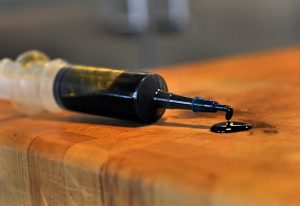
“I’ve used it since 2014 after I was diagnosed with 2 different cancers at the same time. It helped immensely in comparison to the chemo and the pharmaceutical medications.
“After I began using it regularly, I did not need any steroids and got back to work and managed to sleep at night!
“In fact, the first time I took it at night-time I had the first night’s sleep in ages!
“After all the chemotherapy, it felt like I had started to get my life back. Since March, when they took my medication, there has been a return of most of the side effects from chemo.
“I’ve always had a reaction to allopathic medicines, so when I had a reaction to the steroids used with cancer patients my oncologist offered me anti-psychotics, or told me I could always be sectioned!”
“…the first time I took [cannabis oil] at night-time I had the first night’s sleep in ages!”
– Jacqui Ritchie
For medicinal cannabis patients in the UK acquiring their medicine is a difficult task, due to the fact cannabis is still a Class B substance. Due to these regressive laws, patients are stuck between a hard place and a rock: grow their own like Jacqui and face prosecution, or purchase from a street-dealer, which can often be expensive and not the right strain for their symptoms.
“I just couldn’t get the right quality of organically grown cannabis I needed for medicine,” Jacqui explained.
Jacqui claims that the police raid and resulting criminal trial has left her with Post Traumatic Stress Disorder (PTSD):
“I’m horrified! We need legislation for patients! It’s too archaic in Britain at the moment.”

Jacqui, a cancer survivor and mother of two young children, is now facing the prospect of being sentenced to community service, and could even lose her family home:
“A fine wasn’t even considered. I’m under a social work report for sentencing. They are considering community service! They must be joking.
“I’m still struggling with side effects from the chemotherapy, which is even worse since they took all my medicine!
“I am also facing eviction with my 2 teenagers & 5 cats. I’ve lived here for nearly 17 years!”
Jacqui’s sentencing is on the 10th October.
Follow MMJ for updates on Jacqui’s case.
“Research is the only way to legalise”: Heartbroken British Mother Forced the Move to Holland Speaks Out Against UK’s Medical Cannabis Laws
“Research is the only way to legalise”: Heartbroken British Mother Forced the Move to Holland Speaks Out Against UK’s Medical Cannabis Laws
- Hannah Deacon and her son, Alfie, were forced to flee the UK earlier this month to gain access to medicinal cannabis
- Alfie, 6, suffers severe epilepsy and facing life-threatening seizures every week
- Hannah, who believes cannabis oil containing THC is Alfie’s last chance of a normal life, appeared on ITV’s This Morning earlier this year
Earlier this month, we published the heartbreaking story about the latest British child to become a “cannabis refugee,” forced away from his family home just to gain access to potentially life-saving medicine.
Alfie Dingley, who just turned 6, suffers a genetic condition called “PCDH19” which causes severe clusters of hard to control epileptic seizures.
After not responding to traditional, pharmaceutical medications, his heroic mother, Hannah, decided to move her family to The Hague in Holland, where medicinal cannabis is legal.
We caught up with Hannah to find out more about her family’s incredible story. Hannah explained to us how she first came across cannabis as a potential alternative to Alfie’s current, and ineffectual, pharmaceutical medications:
“I was researching natural ways to help epilepsy since Alfie became ill. I’ve never felt health can come from filling yourself with pharmaceutical drugs.
“Cannabis kept coming up all the time. I just tried to find people who it had helped. I was doing lots of research and speaking to families who’d used it too.
“We tried CBD for a few weeks at home and it did make a difference. But we stopped the CBD treatment after we decided to move to The Hague, as we didn’t want to set his baseline at a different point.
“The CBD definitely was helpful and we did see a change.”
“If law makers could really see the suffering my child experiences, I’d hope to think they’d allow him to use this medicine in the U.K.“
– Hannah Deacon
While some patients have reported great success with CBD (the non-psychoactive cannabinoid in cannabis), certain medical conditions, such as epilepsy, need to be treated with THC (the psychoactive cannabinoid) as well.
“It is my understanding that we need to use whole plant cannabis medicine, not just CBD, which is why we’re now in Holland,” Hannah explained.
“We would have much preferred to stay at home with our family and friends and tried medical cannabis under the guidance of our consultant, but it’s illegal.”
Discussing the move from their family home to Holland, Hannah described how difficult the move was: “It’s crazy that after all the trauma we’ve experienced over the last few years, we now have to move away from our support network it’s been very hard.
“The hardest part is that Alfie and Annie, my daughter, do not understand why they can’t see their Grannies, who are a big part of their lives they’re very confused.
“It is very difficult for us all.”

“I feel very sad we’ve had to leave the UK for this treatment. Our world has been turned upside down for the last five years and now we have to keep fighting to do this for him.
“I feel like the patient and the person doesn’t seem to matter. If law makers could really see the suffering my child experiences, I’d hope to think they’d allow him to use this medicine in the U.K.
“It seems so harsh.
“If this medicine works for Alfie, we will campaign to be allowed to use it in the UK under a legal license.”
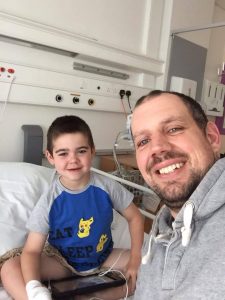
Under British law, however, full spectrum cannabis is still illegal, classified as a Schedule I drug, meaning our Government views cannabis as having ‘no medicinal effect.’
Research on cannabis and its potential medicinal properties is limited due to this classification, something Hannah lamented:
“The current Government says there is no evidence that cannabis has any medical value, yet there are masses of studies done abroad which show cannabinol helps epilepsy in mice models and even human trials.
“If there is no UK research, then pay for some to prove it either way and make it available!”
Hannah and Alfie’s story first made the headlines earlier this year when the mother bravely spoke-out about Alfie’s condition and the potential medical cannabis could have for him on ITV’s This Morning earlier this year.

“When I appeared on TV back in January, I hadn’t created a Facebook or Just Giving page, I just wanted to talk about the importance of allowing children and adults like Alfie to try medical cannabis in their own country!”
The UK needs more parents like Hannah to stand up for their children’s choice in medication. Forcing the issue of medicinal cannabis into the national conversation has propelled the movement closer to legalisation. Normalisation of use could be the best way to pave the way for legalisation.
For more information about Alfie’s progress in Holland, follow his official Facebook page, and to donate to help the family fund his treatment, go to their official Just Giving page.
Pharmaceutical Company Successfully Treats Symptoms of Autism with Cannabinoids
Pharmaceutical Company Successfully Treats Symptoms of Autism with Cannabinoids
- Zelda Therapeutics has demonstrated successful results from their observational trial on cannabinoid-based medicine in treating symptoms of autism in children
- 7% of treated patients showed significant general overall improvement
- Shares in the company rose by 8% after announcing successful results
Zelda Therapeutics, a pharmaceutical company specializing in medicinal cannabis, has announced successful results from their observational trial on autism in Chile.
The trial used 21 autistic children, with an average age of 9, to see if cannabis-based medicines could help alleviate some of the more severe symptoms of autism in patients who had not responded well to pharmaceutical treatments. Over the course of at least a 12-week period, patients were examined by electroencephalogram (EEG), neuropsychological analysis as well as metabolism and genetic tests.
Cannabis extracts were found to be significantly more effective at treating symptoms of autism than the traditional pharmaceuticals, with the cannabis-medicine being well received and tolerated by the patients.
Those treated with cannabinoids exhibited substantial improvements in at least one core symptom including social interaction, language or repetitive behaviours in 71.4% of cases and 66.7% of treated patients showing significant general overall improvement.
Zelda is now planning on taking their research into clinical trials.
Discussing the results of the study, Harry Karelis, Executive Chairman of Zelda, said:
“The results of this observational study are very exciting and supports the anecdotal evidence we have, showing the positive effect medicinal cannabis has on treating autism symptoms.
“Zelda will use this baseline data to design its clinical trials and generate rigorous scientific data that validates the clinical benefit of medicinal cannabis.
“We hope that in the near future Zelda Therapeutics can provide an alternative treatment for sufferers of this condition which is of major global significance.”
These results from this observation trial will help Zelda in the development of its autism clinical trial, with the company expecting the trial to commence within three months of regulatory approvals being obtained and will be conducted over a six to nine-month period.
References and further Reading
Cannabis Refugee: Warwickshire family forced out of UK so epileptic son can access cannabis treatment
Cannabis Refugee: Warwickshire family forced out of UK so epileptic son can access cannabis treatment
- Alfie Dingley, 5, suffers a rare form of epilepsy which cannot be treated with modern, pharmaceutical medications
- Suffering hundreds of seizures a day, his family feels their only choice is to move the child to the Netherlands
- The family are trying to appealing for donations to help fund their move to The Hague
Alfie Dingley, a five-year-old epileptic boy from Warwickshire, has become the latest British cannabis refugee after his family decided to move him to the Netherlands where he can gain access to potentially life-saving medicinal cannabis oil. Alfie’s rare condition means he faces hundreds of potentially life-threatening epileptic seizures a day. His current pharmaceutical medication, including IV steroids he takes during a cluster of seizures, are not effectively working, and often have horrendous side effects.
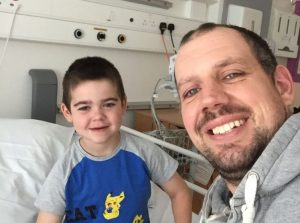
“Alfie is deeply affected by the drugs he is given,” Alfie’s mother Hannah told the Coventry Telegraph.
“The IV steroids Alfie takes when he has a cluster of seizures have serious side effects. They are toxic and cause him to be very aggressive.”
Hannah added to The BBC:
“Our doctor recently told us that if we keep giving him intravenous steroids as we are, that he will have episodes of psychosis or become psychotic, which is terrifying.”
“This is an absurd situation. We are having to move to a new country to get treatment which could transform Alfie’s life.”
– Hannah, Alfie’s Mother.
Hannah made the decision to move the entire family to the Netherlands after researching medicinal cannabis and discovering other parents had successfully treated their children’s epilepsy with cannabis.
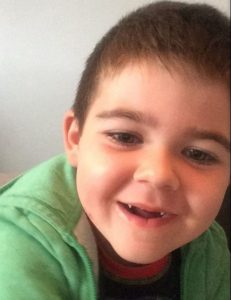
Fearing a possible 14-year jail sentence for giving her son cannabis oil, Hannah explained:
“This is an absurd situation. We are having to move to a new country to get treatment which could transform Alfie’s life.
“We have done a lot of research into whole plant medical cannabis and have found many parents around the world who are using it effectively to either reduce or stop very aggressive seizures.”
Speaking to the BBC, Hannah further explained her family’s decision to move the young boy away from his home: “What choice do we have?
“We can’t stay here and carry on watching our child suffer and with the possibility of having severe mental health problems.”
The family is appealing for donations from the public to help fund their move and, hopefully, for life changing treatment for Alfie. So far, they have managed to raise £2,000 out of their £15,000 target which has facilitated the first step:
‘We now have to raise enough money to take Alfie abroad so we can try this life-saving medicine with him, in the hope that it gives him the chance of a normal and happy life.”
To donate to Alfie’s cause, visit his JustGiving page.
References and further Reading
Cannabis and Blindness: Study offers hope to Retinitis Pigmentosa sufferers
Cannabis and Blindness: Study offers hope to Retinitis Pigmentosa sufferers
- Recent studies have shown cannabinoids to have potential preventative effects of blindness in Retinitis Pigmentosa sufferers
- Anecdotal evidence also exists of blind patients temporarily regaining their sight after using medicinal marijuana
- Could cannabis really offer hope to the blind?
Retinitis Pigmetosa (RP) is a rare, genetic disorder which involves a degeneration of cells in the retina affecting roughly 1 in 4,000 people worldwide. RP causes photoreceptors in the retina to die over time, resulting in severe vision and blindness if left untreated.
Unfortunately, there is no known cure for RP. Recent studies on medical cannabis, however, may offer some hope to those suffering from vision-related diseases, including Retinitis Pigmentosa and glaucoma. Researchers at the University of Alicante in Spain conducted a study in 2014 to see the impact cannabinoids had on the vision of blind rats.
Using two groups of rats; those given a synthetic cannabinoid [the active chemicals found in cannabis] over a 90-day period, and those without, researchers found that those rats given the cannabinoids had 40% more photoreceptors in their eyes.
The study noted that the data suggested that cannabinoids are “potentially useful to delay the retinal degeneration in Retinitis Pigmentosa patients.”
Researchers stressed that more research is needed before conclusions can be made from the data as they were unable to identify how cannabinoids are able to delay loss of vision in RP patients. But progress has been made on a stubborn disease which, so far, has been incurable by modern medicine.”…cannabinoids are potentially useful to delay the retinal degeneration in Retinitis Pigmentosa patients.”
Other studies have found cannabinoids, such as CBD and THC, have potential neuroprotective effects which could prevent loss of vision and encourage overall eye health.
The most recent research, conducted by researchers at Montreal Neurological Institute in Canada last year, found cannabinoids can improve low-light vision by making cells in the retina more sensitive to light. These results suggest benefit cannabis could provide a significant benefit in the treatment of degenerative eye diseases.
Previous research from Jia Chen in 2005 found both CBD and THC function as neuroprotective agents and antioxidants, allowing them to increase the chance of cell survival within the eyes.
Our body’s endocannabinoid system plays a vital role in the regulation of vasoactivity in our eyes, as indicated by research from Spanish researchers in 2010, who found that THC and CBD decrease intraocular pressure, providing the groundwork for a potential treatment of glaucoma.
While there is no definitive answer, yet, on whether or not cannabinoids can be truly effective in treating and even preventing blindness caused by degenerative retinas, there is certainly promise.
References and further Reading
http://www.sciencedirect.com/science/article/pii/S0014483514000347
https://elifesciences.org/articles/15932
https://www.ncbi.nlm.nih.gov/pmc/articles/PMC1824211/


